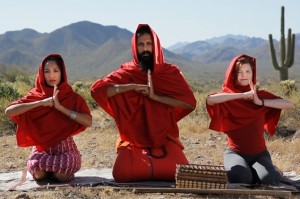By Vincent M. Hills
Vincent M. Hills is a now graduate of the University of Alabama who majored in History with a minor in Religious Studies. The following was written for REL 360: Popular Culture/Public Humanities.
Kumaré is a very interesting “documentary”, but for many different reasons than most documentaries. The film did not wow viewers with interesting facts or show picturesque landscapes, it did however show a side of Western culture that is often the brunt of criticism from many people, but never actually investigated. Vikram Gandhi was a typical American kid who begrudged the way his family tried to impose their Hindu beliefs and practices on him. A few years after graduating college, Gandhi decided to see how easy it would be to pretend to be a guru from the Far East, and actually have people listen to him. The documentary details his experience. From the perspective of a religious studies scholar, the film provides a plethora of thought provoking scenes.
When Vikram Gandhi transforms into “Kumaré”, it’s comical, but eventually the act takes on a seriousness no one could have seen coming. Gandhi’s original question of whether fabricated spirituality would incite a placebo effect among the people he interacted with was quickly diminished. It was obvious that people believed he was genuine, not only because he looked the part, but also because he seemed like a very introspective and genuine person. Apart from the other people who claimed they were gurus, many of the people who “fell” for Kumaré’s trick, were all at a point in life where they were seeking some type of help. I don’t believe that this is a mere coincidence. The documentary reinforced my, and potentially many others belief that people are most vulnerable when they are emotionally unstable. The question becomes: do these people generally have areas of their lives in which they find themselves emotionally unstable, and they believe the only way they can feel better is through the power of a higher power? The answer to this question can never be effectively answered, however, it’s something people should take into account. It’s important to remember that sweating the details doesn’t make for good entertainment, the primary purpose of this film.
The larger question being asked by the documentary is does it matter that the perceived “truth” in Kumaré is actually a lie, if the elicited response mirrors those who supposedly follow “real” faiths or spiritual guides? Gandhi certainly thinks it doesn’t. Throughout the film, Kumaré speaks to his followers about finding their “inner guru”. They don’t need to look to other people, but rather, simply look inside themselves. His contention is that no guru/prophet is more real than another; some of them just believe their own lie. The question then becomes why do people, well educated, often thoughtful people, get sucked into groups not only like Kumaré’s, but also to more mainstream religions on one hand, and potentially dangerous “cults” on the other? These gurus are essentially selling their religion or philosophy. In the same way a used car salesman enamors a customer; many gurus say the right things in order to establish trust. This is only an inherently bad thing if the person following the “act” ends up being hurt by any number of the tactics employed by the guru to gain his/her following.
Arguably the most interesting part of the documentary comes when Gandhi begins to realize how much he is being affected by his own transformation. Initially, he struggles to reveal his true identity to his followers. There seems to be lies within truth and truth within lies. Was he so invested that he actually began to believe the lie? Or was he simply overwhelmed by experiencing his initial hypothesis? Regardless of the real answers to those questions, this experiment opened the door for further investigation into this particular religious phenomenon. In the end, Kumaré poses more questions than answers, but this does not take away from its exceedingly interesting premise.
A final consideration viewers of the film should take into account when watching the film is why certain aspects of Gandhi’s experiment were shown and others not. That isn’t to say that there were any political ramifications in place, however, it’s important to remember that the film was definitely arranged in order to maximize its entertainment value. Overall, Vikram Gandhi shined a light on a subject that is a sensitive area for many people, and to his credit, he did so in the least invasive and most effective way he saw possible, and it’s reasonable to expect future research will be geared toward similar experiments.
